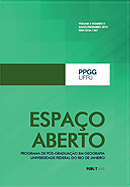Migration Policy, Structural Violence and HIV/AIDS
DOI:
https://doi.org/10.36403/espacoaberto.2019.18960Keywords:
International migrations. Repressive policies. Marginalization. Structural violence. HIV/AIDS epidemicAbstract
Contextualized in the current political scenario of international migrations, this article discusses citizenship asymmetries and exclusions inherent to migratory mobility, with particular attention to understanding their repercussions in HIV epidemiology. The analysis is eminently theoretical and conceptual and is based on bibliographic research oriented to unravelling links between dominant migratory policies and HIV/AIDS. During the course of the work it becomes increasingly clear that the most prosperous countries tend to adopt selective-repressive migration regulations driven by economic criteria, security panics and identity phobias. This gives rise to political-administrative obstacles and citizenship boundaries excluding people involved in misery migration, which intensifies their marginalization even more. Along with this structural violence, epidemiological vulnerability to HIV is generated, increasing the risk of contagion, constraining access to care for those already infected, and hindering collective strategies to cope with infection within the public health systems.


